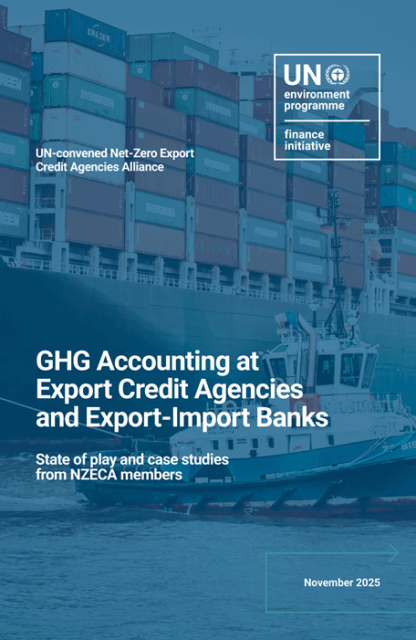Export credit agencies (ECAs) and export-import banks play a vital role in global trade, and in financing the transition to a low-carbon economy. By assuming risks beyond commercial appetite, they enable innovation, technology transfer, and large-scale projects that might otherwise lack financing.
As these institutions work to align their activities with net-zero pathways, understanding and managing their climate impact has become increasingly important. However, existing greenhouse gas (GHG) accounting standards are not well suited to ECA products, particularly guarantees and export credit insurance. This creates significant challenges for accurately measuring and managing portfolio emissions across the sector.
This paper — the first in a series of technical notes from UNEP FI’s Net-Zero Export Credit Agencies Alliance (NZECA) — is designed for ECAs and ExIm banks seeking to strengthen their approach to GHG accounting. It shares the practical experiences and methodologies of NZECA members, highlighting case studies that address the unique complexities of ECA portfolios. By fostering shared learning and methodological development, the paper aims to advance more consistent, transparent, and credible GHG accounting practices across the export credit community, supporting their collective contribution to the global net-zero transition.
About the Net-Zero Export Credit Agencies Alliance
Launched at COP28 in 2023, the UN-convened Net-Zero Export Credit Agencies Alliance (NZECA) unites leading public finance institutions committed to supporting the decarbonization of international trade and facilitating joint action from public and private finance and their real economy counterparties in pursuit of the Paris Agreement goal to reach net-zero portfolios by 2050 or sooner, consistent with a maximum temperature rise of 1.5°C above pre-industrial levels by 2100. Learn more about the alliance and its members here.



